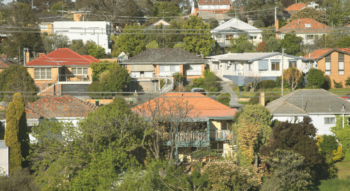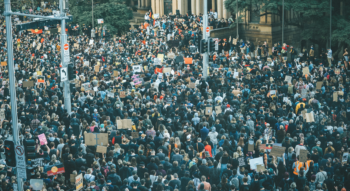Episode Notes
How can the voice of children and young people count if they aren’t counted in elections? When you turn 16 you can drive a car, consent to medical procedures and pay taxes—but you can’t vote.
Professor Lisa Hill explains why we’re so scared of giving younger people a vote, and shares fascinating research about 16 and 17-year-olds in the voting booth.
Transcript
Ginger Gorman:
For some it’s a hassle, but for many, it’s a rite of passage: voting in the first election after you turn 18. You do your research, maybe ask your parents what they think. Then maybe you do the complete opposite. Then you head down to your local polling booth, which is possibly the first time you’ve set foot in a primary school since you finished year six. You line up, nervous with anticipation, and a little bit worried you’ll stuff up and then accidentally elect one of the quirky independents whose platform you can’t abide. You’re handed the little lower house sheet and the giant, unmanageable Senate ballot. You go to the cardboard booth to make your selection. Then on the way out, you treat yourself to a democracy sausage. Voting is a simple enough process that only happens every couple of years. It is much less complicated or dangerous than driving a car. But in Australia, you can start driving when you’re 16, two whole years before you can vote.
Professor Lisa Hill:
When I started out, Ginger, I thought, “Don’t be silly. Have you ever met a 16-year-old? I used to be one”.
Ginger Gorman:
Professor Lisa Hill from the School of Social Sciences at the University of Adelaide has heard all of the arguments against lowering the voting age.
Professor Lisa Hill:
As a lot of them say, “It won’t make any difference, they’re so lazy they won’t turn out.” But we know from experiments and studies elsewhere, 16 to 17-year-olds will turn out in higher numbers than 18 to 24-year-olds, so that’s not true. They say that the young lack the political maturity and competence to vote. There’s been a lot of testing on this, and they’re just as morally mature and able to do it as someone a bit older. Young aren’t very good on decisions to do with hot cognition where there’s maybe alcohol involved or peer pressure involved or excitement involved.
But in these testy-type situations like voting, they’re just as good. We also know from a study done in Ghent, in Belgium, that young people are just as capable of casting a congruent vote as an older person, meaning a vote that’s consistent with their expressed preferences. People say that their bad decisions will be visited on themselves so they’ll do mad things like lower the age of consent, abolish bedtimes, abolish controls on the internet, and that’s just a bit silly because you’ve got to remember they’ve got to get it past the parliament.
Ginger Gorman:
After reading widely and researching thoroughly, Lisa reached this conclusion.
Professor Lisa Hill:
I couldn’t see one reason not to enfranchise 16, 17-year-olds.
Ginger Gorman:
This is Seriously Social. I’m Ginger Gorman speaking to you from Ngunnawal country and we are back for another season to delve into the social sciences and see what they can tell us about ourselves and the people around us. Today on the podcast, should we lower the voting age so that the next generation can have its say sooner? And if we do, just how low should we go?
Maya Farmer:
I just think that giving young people the vote is going to give them so much more power and have an actual say in so many issues. Basically, all of my friends have jobs and many of them actually do pay taxes, and yet we don’t get a say on where this money goes.
Ginger Gorman:
Maya Farmer is 17 and like a lot of her peers, she cares deeply about social issues.
Maya Farmer:
There are so many issues affecting society that do not exclude young people, and moving the power to actually have a say in how these issues impact them is just so detrimental. Me personally, I’m worried about many issues, from climate change to the housing crisis with inflation and prices going up. In fact, I think there are so many issues that actually affect young people even more than they do adults.
Professor Lisa Hill:
John Wall asked us to conduct a thought experiment on ourselves and say, “Look, what if I was to say to you that we would raise the voting age to 50 for everyone, how do you feel about that?” And automatically we all bristle at that. And he says, “Well, that’s how it feels for younger people. You shouldn’t have to wait to get representation if you want it.”
Ginger Gorman:
For all of the reasons Professor Lisa Hill and Maya Farmer have outlined, Lisa believes the voting age should be lowered to 16, and importantly, she believes it should be compulsory from 16.
Professor Lisa Hill:
According to the Condorcet’s theorem, which is supported by empirical data, the more people you enfranchise, the better the decisions become. And I’ve done some work on that about compulsory voting regimes and it does seem like somehow along the line, the inclusion of more people leads to better governance. Governors govern better.
Ginger Gorman:
But why 16? Why not 13 or 12? Why not six? How young is too young to participate in democracy?
Professor Lisa Hill:
Sometimes I see arguments in the literature. People say that you should have a vote from age zero and your parents should have a proxy vote for you, which I’m not in favor of. Some say 12, because 12 is where you start to show the moral maturity of an adult in these cold cognition settings. I say 16 to 17 because this is consistent with a lot of other obligations and allowances we have in our society, such as the age of consent or the age of being able to marry or have a child or with 17 you can join the military. 16- to 17-year-olds can give blood, change their name, all kinds of other things, or be tried as an adult. So 16 to 17 sounds fine to me, 16.
Ginger Gorman:
But it is a bit arbitrary because people at 14 and three-quarters can get a job and start paying taxes, but then they’re not allowed to vote with what’s done with their money.
Professor Lisa Hill:
I know. It is arbitrary. You’re right. The only way we can solve it is to have it from zero, but then I worry this is just multiplying the voting power of parents with a lot of children and there’s, I can see some merit in that, but on the other hand, it really concerns me.
Ginger Gorman:
And you’ve got 10-year-olds being put in adult prisons in Australia. So then there’s an argument about is that fair that they are essentially subject to adult laws but have no franchise.
Professor Lisa Hill:
Precisely. So yes, it is arbitrary and I don’t know how to solve this problem. Either you do it in an absolutist way by starting it at zero or just you could just say, “Look, 16- to 17-year-old, that’s what the public will accept.” So maybe this has just got to be a strategic decision. They probably can’t accept 12-year-olds.
Ginger Gorman:
I’d always assumed politicians were the most resistant to lowering the voting age because younger voters might be less willing to vote for the establishment. But in fact, Lisa says it’s the general public who need more convincing.
Professor Lisa Hill:
Well, a lot of the time it’s parents that have just had the most irrational conversation with their teenager that has ever been heard, and they don’t think their children have the moral maturity. But I think part of it is also, because voting is a form of power, and it means you’re going to be sharing power. And people naturally balk at it. They don’t even realize they’re doing it. They don’t want to share power, but societies are healthier where power is shared. We know that. They’re more stable, they’re happier where there’s more equality.
Ginger Gorman: There is a real equity argument here, isn’t there? Where young people are subject to so many decisions about their lives in various different quarters and yet essentially treated as if they’re not full citizens.
Professor Lisa Hill:
Or full persons. And there was a study done on climate anxiety globally, and all the young people interviewed had tremendous levels of anxiety. And the thing that I found really sad was they feel guilty that their older generations are ruining the planet and they have to just stand by and watch it and then inherit it. So they have feelings of betrayal and anger and guilt. Now, we all know that young people aren’t very happy now. They’re more anxious and worried than they ever were because the world is more frightening. 75% of that large study, 75% of the kids in that study said they found the future very frightening, the idea of the future very frightening. And that is awful. This will give them some stake in it and some say over it and it would allay their feelings of guilt at not doing anything. And it would allay their feelings of being betrayed by older generations as well.
Ginger Gorman:
So you’re arguing that if those younger people could vote, that would give them a way to solve or at least attempt to address their climate anxieties.
Professor Lisa Hill:
Exactly. It would give them actual power to do something about it, but it would be a really good measure towards mental health. And also it’s a class anger as well. And so that’s not good for the society. It’s good in a million different ways, but it would also allay their anxieties that aren’t based in their imaginations. The world is going to hell and they would like to do something about it, so. And they also, the other thing they’re really worried about is their financial insecurity too.
Maya Farmer:
Voting is in every way a human right, and there’s completely no reason why young people should be denied this right to vote. I’ve become so much more interested in what is actually going on in society than I was, say, five years ago. And I think if young people were given the vote earlier, then this will replicate and people are going to be more interested in society, more interested in what’s actually happening. And I really don’t see any reason why that is a negative instead of a positive.
Ginger Gorman:
So you say that young people should be able to vote. When do you wish you could have started to vote?
Maya Farmer:
I wish I could have started even before turning 16 years old. I think personally that being 13 years old is the perfect time to be given the vote. It’s when we start to become more independent, we’re off to high school. We have greater access to resources that we can use to educate ourselves.
Ginger Gorman:
You mentioned the age 13 there, and I can imagine some of our listeners gasping and thinking 13-year-olds are erratic, they’re not at mature enough, they’re not across the issues enough and perhaps even that they should be given a chance to have childhoods, be able to play. They’re simply not old enough to have that big responsibility of voting. How would you respond to people who might think that way?
Maya Farmer:
Yeah. Oh, there’s so much to unpack here. So I think I’ll just start with the idea of how important it is to have a childhood. I completely agree. But look, voting is not going to take away from that. It’s just going to mean you’re a little bit more interested in how society works and look, the actual vote itself, that takes less than a morning. I think also there’s a really important consideration that if young people, if there’s a younger age restriction, so that is currently people under 18 years old aren’t allowed to vote, then it doesn’t make sense that there isn’t, say for example, an older age restriction.
Obviously, I’m very much against age restrictions in total, but it is very hypocritical that elderly people are allowed to vote and when young people aren’t, considering that, I know so many people who are affected by biases in the media, both young and old. So it just doesn’t make sense to place all of the blame on young people when young people being given the vote are going to actually be taking a more serious role in society and ultimately give so much more back to society and reap so much more from society, because they are going to have an impact in the issues that matter and matter to them, instead of just allowing adults to make all the decisions.
Ginger Gorman:
There’s another big question that we have to tackle if we want to talk about 13-year-olds voting, and that’s political advertising. It’s hard enough as an adult to trust the messages that pollies put out there when they are desperate for your vote. How would they approach marketing to children? And in the age of the influencer, who could possibly police the ethics of that? Here’s Professor Lisa Hill again.
Professor Lisa Hill:
We can educate children in school to know how to be citizens and to know how to be critical about in their consumption of political news. And we’re already doing that a little bit in schools in a way that it wasn’t done for my generation. The other thing I’ve been working on is truth in political advertising. So that’s been one of the projects I worked on last year, devising a legal regime to control all the lies and disinformation and conspiracy theories that are eroding our political culture.
So laws like that could help, but we can teach people to be critical subjects, I hope. But we’re all victim to it. 70% of adults in a recent study, it was a very big study, were rated overconfident of their ability to tell fake from real news. So everyone is probably overconfident, everyone is probably a little bit incompetent. So we all need to learn that, not just kids, they might even be more savvy about it actually, in being able to spot fake stuff from real stuff.
Ginger Gorman:
And I wonder if we lowered the voting age as well, whether education in schools around politics would actually get stronger.
Professor Lisa Hill:
I think it would. And you’ve got a captive audience there too, in the way that you haven’t with the general public. So you could really train them to be super citizens and super competent citizens as well. And another thing with bearing in mind, a lot of people don’t know this about Australians, but people in compulsory voting writing regimes actually already are more sophisticated than people in voluntary regimes. So we’re already ahead of the game, but we could polish it up a bit with some thoughtful curricula.
Ginger Gorman:
It’s also one of those things where your kid comes home and tells you something they’ve learned at school and you think, “Oh, I didn’t know that.”
Professor Lisa Hill:
Yeah, I know.
Maya Farmer:
If young people aren’t equipped to vote, what makes turning the magical age of 18 suddenly equipping them to vote? Every election, so, so many adults throw away their votes and so, so many adults succumb to the advertising, the campaigning that politicians throw out in a desperate bid to secure votes for themselves. And you know what? If people are going to argue that young people aren’t equipped to vote because they don’t understand power, they don’t understand parliamentary processes, I think that argument could be perfectly also fitted towards older people.
Ginger Gorman:
So there’s no question Maya will enrol to vote if she hasn’t already. But despite her enthusiasm, a lot of people aren’t champing at the bit to cast their vote the moment they’re legal.
Professor Lisa Hill:
The overall population, about 90% of enrolled voters will tend to vote in any given election, sometimes going as high as 95, but lately around 90. Of young people, it’s hard to model it, but we think it’s around 77% or less. So that, in electoral studies, that’s a huge gap. An electoral studies gap that’s significant is four percentage points. So to have that many percentage points between two social groups is really big.
Ginger Gorman:
It’s important not to hear those figures and then assume it’s a failure of the youth.
Professor Lisa Hill:
Young people think of voting as the things their parents do. They look at politicians. It doesn’t look like anyone they know. They don’t feel that they’ll be represented. Politicians don’t represent them. They do more alternative non-arena, we would call it activities such as clicktivism, which some people call slacktivism. They’re much more narrow in their interests, so they’re not interested in politics broadly. They’ll be interested in one or two things. This is very different from older generations, and that’s one of the reasons why they don’t join political parties so they don’t get energised. Being a member of a political party is one of the most important correlates of propensity to vote. So there’s a lot of things feeding into it, but parliamentary politics and electoral politics don’t resonate with them. They need to get connected back in there.
Ginger Gorman:
This is really interesting, Lisa, because someone like me sees it as a duty to vote and I actually get quite excited on election day. This cohort you are talking about does not see it as a duty to society, somehow.
Professor Lisa Hill:
No, it’s really interesting. And that is the norm in Australia, more so than in any other country anywhere, Ginger. Australians are more likely than anyone in the democratic world to say that voting is a duty. And we consider it both a right and a duty, and it is a duty under law. It’s required. Younger people tend to think of it more as a right but not a duty, so this is kind of a generational shift.
Ginger Gorman:
So why aren’t 18-year-olds as keen on voting as Australians in other age groups?
Professor Lisa Hill:
It’s, young people inhabit a more individualised rights world than older generations. We’ve always seen things in terms of the bigger picture and each other and what we might owe to each other. Younger people tend to see things more in terms of individual rights and freedoms. Older Australians seem to think of things more in terms of…you know, of course, they think of their own rights and their own needs, but they think of their obligations to others as well.
Ginger Gorman:
Is this assessment really fair, though? Are we falling into the trap of blaming kids these days for having exactly the same attitudes about the world that we had when we were their age? I guess we just have to remind ourselves that not all young people are alike, but Lisa has this message for the ones who have yet to enrol to vote.
Professor Lisa Hill:
I wish young people understood and they would join the dots, which is a direct line between their failure to be engaged electorally and the way they’re being screwed by older generations. So right now, the fact that the electorate is older and the fact that, it’s true in Australia as it’s true anywhere else, that politicians know who their customers are, and if you’re not one of their customers, they will not serve you. So they know their customers are older, so they design policies that benefit these older generations and they ignore the young. The young are poorer than they ever were. Their jobs are more insecure. Their chances of owning a home are getting smaller and smaller and smaller. Everything about their life is worse than it was for my generation. They’re shrinking themselves as an electorate and because of slowing birth rates, they’re naturally shrinking. So their power electorally is shrinking anyway. So they really need to get their dukes up, enrol, and vote, so they can get some representation in parliament.
Ginger Gorman:
If we actually did this, if we followed in the footsteps of countries like New Zealand, Scotland and Brazil and lowered the voting age to 16, should it be compulsory or voluntary?
Professor Lisa Hill:
Everyone wants the right, but they don’t want the duty that the rest of us have. In Australia, it’s a duty, so that’s how it’s got to be. Democracy requires work. We all have to pitch in and it can’t be just some and not the other. The problem here is it would be a thin edge of the wedge on compulsory voting, and it would create confusion about whether voting really was compulsory if people got the idea at the beginning. So your voting habits are entrenched the first time you’re enfranchised, and so people will get the idea too early that it is voluntary. But the main reason it makes me unhappy to think about that is that it would only entrench the inequalities we already have in Australia and which voluntary systems have. Now, in voluntary systems where you can choose not to vote. The people that end up voting are the well-off. The white people, the people with the house, people that have lived there all their lives, the people that speak the dominant language, people with money, people who are educated.
These are the people that vote, and the people that are poor and disadvantaged and don’t speak the dominant language and all that other stuff, they’re the ones that tend to, like people who are homeless, people that have disabilities, all kinds of things, unemployed, they’ll tend not to vote. Now, they’re the very people that need to vote to get the protection that I know for a fact voting can give you economically and socially. We’ve got inequalities here and it would only entrench them earlier. So in order to avoid that greater evil of entrenching inequality even further in this country, everyone should be required to vote.
Ginger Gorman:
Thanks for listening to Seriously Social. I’m Ginger Gorman. This podcast is produced on Ngunnawal, Yuggerah and Turrbal land, and we pay our respects to elders past and present. Seriously Social is produced by Kim Lester, engineered by Mark Gargoldonk, AKA Baldy, and our executive producers are Bonnie Johnson and Clare McHugh. It’s an initiative of the Academy for Social Sciences in Australia. Next time on Seriously Social, what drives people into poverty? Nobody plans to be poor, so what are the causes? And more importantly, how can we band together and bring about change? See you then.
Useful Links
- Voting at 16: Does lowering the voting age lead to more political engagement? Evidence from a quasi-experiment in the city of Ghent Cambridge University Press
- Condorcet’s Theorem 1000-Word Philosophy
- Climate anxiety in children and young people and their beliefs about government responses to climate change: a global survey The Lancet




